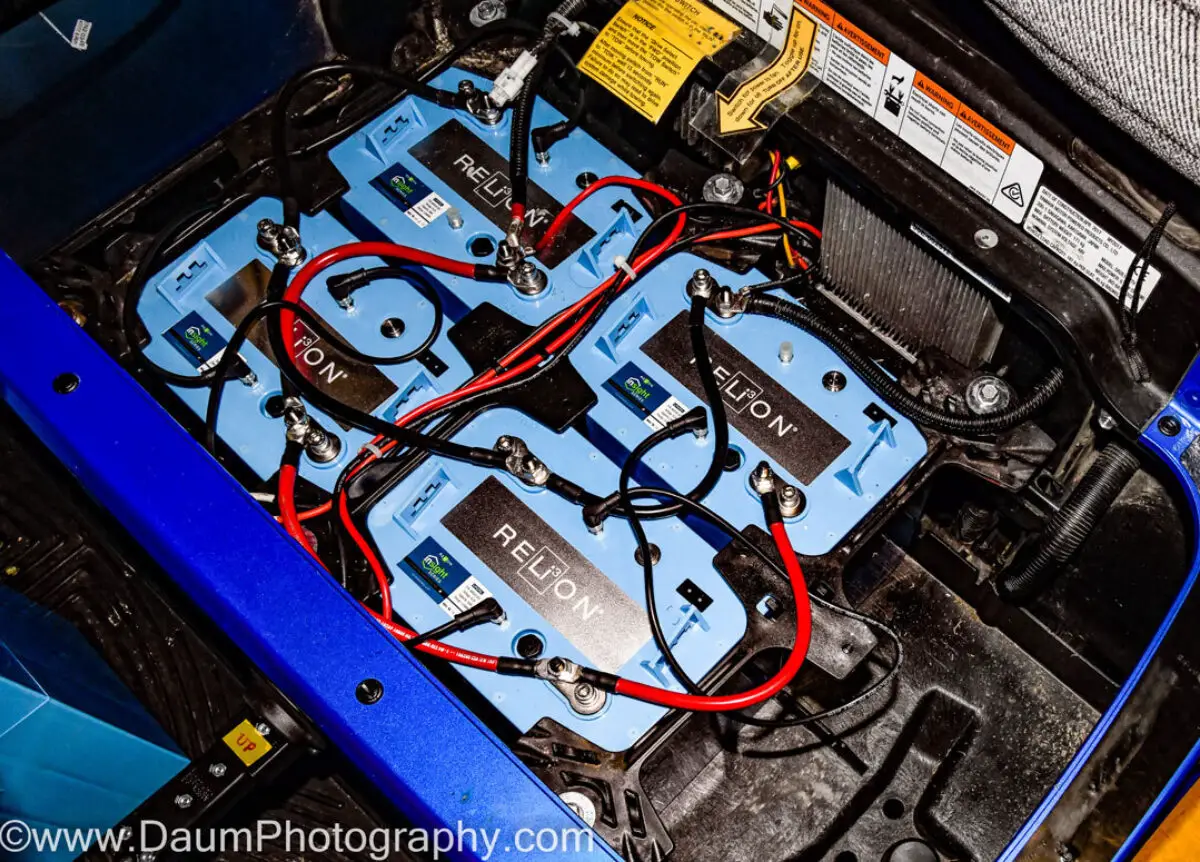How Long Do Lithium Golf Cart Batteries Last

Lithium golf cart batteries have revolutionized the world of golf carts, offering improved performance, longer lifespan, and enhanced efficiency compared to traditional lead-acid batteries. As golfers rely on their carts to navigate the greens and enjoy a seamless golfing experience, understanding the lifespan of lithium batteries is essential for planning and maintaining reliable power on the course.
In this informative guide, we will explore the question that golf cart owners and enthusiasts often ask: “How long do lithium golf cart batteries last?” We will delve into the factors that influence battery lifespan and provide valuable insights into maximizing their longevity.
With their lightweight design, rapid charging capabilities, and extended cycle life, lithium golf cart batteries have become the preferred choice for golfers seeking optimal performance and reliability. However, the lifespan of these batteries can vary based on various factors, including battery quality, usage patterns, charging practices, and environmental conditions.
Whether you are a golf cart owner looking to invest in lithium batteries or a golfer curious about the lifespan of your existing battery, this guide will equip you with the knowledge necessary to make informed decisions and ensure the longevity of your lithium golf cart batteries.
Join us as we navigate through the intricacies of lithium battery technology, explore the factors that impact their lifespan, and provide practical tips for optimizing performance and extending the life of your golf cart batteries. Let’s dive in and unravel the secrets behind how long lithium golf cart batteries last.

Understanding Lithium Golf Cart Batteries
Lithium golf cart batteries are rechargeable power sources that offer several advantages over their lead-acid counterparts. These batteries utilize lithium-ion technology, which provides higher energy density, longer cycle life, and lighter weight. The transition from lead-acid to lithium batteries has revolutionized the golf cart industry by offering improved performance and longevity.
Factors Affecting the Lifespan of Lithium Golf Cart Batteries
The lifespan of lithium golf cart batteries can vary depending on several factors. Understanding these factors will help you optimize battery performance and ensure longevity. Let’s explore the key factors below:
Battery Quality and Manufacturing
The quality of the battery and the manufacturing process play a crucial role in determining its lifespan. High-quality lithium golf cart batteries undergo stringent quality control measures during manufacturing. Reputable manufacturers prioritize the use of premium materials, advanced manufacturing techniques, and rigorous testing to produce batteries with extended lifespans. Investing in batteries from trusted brands ensures reliability and longevity.
Depth of Discharge
The depth of discharge (DOD) refers to the amount of battery capacity used during each discharge cycle. Deep discharges, where the battery is drained significantly, can have a negative impact on the lifespan of lithium batteries. It is recommended to avoid frequent deep discharges and instead maintain a moderate depth of discharge. By operating within the recommended DOD range, you can prolong the lifespan of your lithium golf cart battery.
Charging Practices
Proper charging practices are crucial for maximizing the lifespan of lithium golf cart batteries. Using compatible chargers specifically designed for lithium batteries is essential. Avoid using chargers intended for lead-acid batteries, as they can damage lithium batteries. Follow the manufacturer’s guidelines for charging duration, voltage, and temperature limits. Overcharging or undercharging can impact the battery’s longevity, so it’s important to adhere to the recommended charging practices.
Environmental Factors
Environmental conditions can significantly affect the performance and lifespan of lithium golf cart batteries. Extreme temperatures, both hot and cold, can impact battery performance and reduce lifespan. It is advisable to operate lithium batteries within the recommended temperature range specified by the manufacturer. Additionally, exposure to high humidity or moisture can lead to corrosion and other issues. Proper storage and operating conditions are essential for maintaining battery health.
Average Lifespan of Lithium Golf Cart Batteries
The average lifespan of lithium golf cart batteries varies depending on various factors. While there is no precise answer to how long they will last, the following are general estimates based on industry standards and user experiences:
- Battery Lifespan: On average, lithium golf cart batteries can last anywhere between 5 to 10 years. However, with proper care and maintenance, some batteries have been known to exceed this range. It’s important to note that individual results may vary based on usage patterns and environmental conditions.
- Cycle Life: The cycle life of a lithium golf cart battery refers to the number of complete charge-discharge cycles it can undergo before reaching the end of its useful life. Most lithium batteries for golf carts have a cycle life of around 1,000 to 2,000 cycles, with some higher-end batteries offering even greater cycle life.
It’s essential to keep in mind that these estimates are approximate and can be influenced by various factors such as usage patterns and maintenance practices. The actual lifespan of a lithium golf cart battery can be longer or shorter based on how it is used and cared for.
Maximizing the Lifespan of Lithium Golf Cart Batteries
While the lifespan of lithium golf cart batteries is influenced by various factors, there are steps you can take to maximize their longevity. By following these tips and best practices, you can ensure that your lithium batteries serve you well for an extended period:
Regular Maintenance
Regular maintenance is crucial for optimizing the lifespan of lithium golf cart batteries. Here are some maintenance tasks to consider:
- Keep the batteries clean: Regularly inspect and clean the battery terminals and connections to prevent corrosion and ensure good electrical contact.
- Check for damage: Inspect the battery casing for any signs of damage or leaks. If you notice any issues, consult a professional for assistance.
- Ensure proper ventilation: Provide adequate ventilation in the battery compartment to prevent excessive heat buildup, as high temperatures can shorten battery life.
Proper Charging Practices
Adhering to proper charging practices is vital for maximizing the lifespan of lithium golf cart batteries. Consider the following guidelines:
- Use the right charger: Use a charger specifically designed for lithium batteries and compatible with your golf cart’s battery system. Avoid using chargers intended for lead-acid batteries.
- Avoid overcharging or undercharging: Follow the manufacturer’s recommended charging guidelines in terms of duration, voltage, and temperature limits. Overcharging or undercharging can impact battery performance and longevity.
- Charge after use: Ideally, charge the batteries soon after each use to maintain optimal charge levels.
Storage Considerations
If you plan to store your golf cart for an extended period, follow these recommendations to preserve the lifespan of your lithium batteries:
- Store at moderate temperatures: Whenever possible, store the golf cart and batteries in a location with moderate temperatures. Avoid extreme heat or cold, as they can affect battery performance.
- Maintain a partial charge: If storing for an extended period, ensure the batteries have a partial charge, typically around 50%. Avoid storing them fully discharged or fully charged.
- Periodic maintenance charge: If the golf cart will be in storage for an extended time, consider giving the batteries a periodic maintenance charge to prevent self-discharge.
Battery Management Systems (BMS)
Some lithium golf cart batteries come equipped with a Battery Management System (BMS). A BMS is a system of electronic components that monitor and regulate the battery’s performance. It helps balance the charge across individual cells, protects against overcharging and undercharging, and monitors temperature. If your golf cart has a BMS, ensure it is functioning properly and consult the manufacturer’s guidelines for optimal usage.
Conclusion
The lifespan of lithium golf cart batteries can vary depending on factors such as battery quality, depth of discharge, charging practices, and environmental conditions. On average, these batteries can last between 5 to 10 years with proper care and maintenance. By following recommended maintenance routines, using compatible chargers, and storing the batteries correctly, you can maximize their lifespan and enjoy extended use.
Remember, individual experiences may vary, and it’s important to consult the manufacturer’s guidelines specific to your battery model. With the right approach, you can optimize the performance and longevity of your lithium golf cart batteries, ensuring reliable power and enjoyment on the golf course for years to come.





